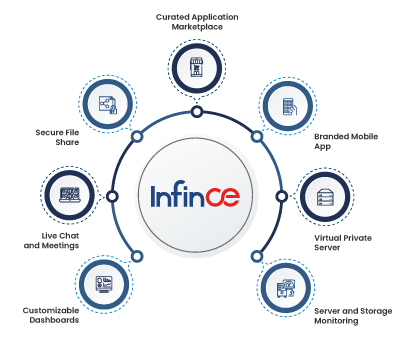The necessities of Covid-19 made companies rethink their priorities regarding managing their workforce. As a result, remote work shifted from being a short-term quick fix to a long-term solution for increased efficiency and productivity. And in the post-pandemic world, work has become more partially remote, aka hybrid, than fully remote.
Hybrid Work Defined
A hybrid workplace blends both virtual and on-site arrangements to give employees the flexibility of dividing their working hours between the office and home. As a result, the employees enjoy more autonomy and life-work balance while remaining more engaged and productive at work.
So, Why is Hybrid Work Relevant?
A Salesforce post says, “today’s hybrid workplace would soon be called just “the workplace”. A survey of 278 executives by McKinsey revealed that the surveyees planned to reduce their office space by 30%, indicating an increased acceptance of remote work, be it partial or otherwise. Cloud technologies and the right online tools would enable your employees to access data, connect with their colleagues from anywhere, and get their work done in a networked environment.
The McKinsey study “The postpandemic future of work: Hybrid, remote and what’s ahead” surveyed 100 executives across multiple industries and geographies say that 9 out of 10 companies would go for a blend of remote and on-site working. As work culture gets increasingly hybrid, companies need to ensure efficient online tools are in place to enable their employees to collaborate and communicate seamlessly to get their work done. Organizations need to enforce the specifics required for a mix of remote and on-site work on a permanent basis to keep their hybrid workforce productive.
Read more: Tips in Building a Hybrid Workplace for the Future
Benefits of a Hybrid Workplace
A hybrid workplace brings quite a few benefits to the table.
1. Flexibility at work leaves workers happy
Increased flexibility and reduced commute would help employees enjoy a better work-life balance.
2. Reduces operational costs
Hybrid workplace solutions reduce the cost of real estate and office supplies considerably. The money saved on rentals can be invested in technology, marketing, etc.
3. Increases productivity and efficiency
Working from the comfort of their homes and flexible working hours have proven to increase employee productivity and efficiency.
4. Boosts employee engagement
A hybrid working model boosts collaboration among your remote teams, thus keeping them more engaged at work.
5. Offers location independence
A hybrid work model will essentially have a remote work infrastructure in place, enabling your workforce to work from anywhere in the world.
6. Enhances company culture
A blend of remote and on-site work would motivate your employees to remain more productive and engaged and proactively contribute toward the company’s goals and culture. On-site working days can hold face-to-face meetings and build interpersonal relationships among employees.
Post-pandemic, companies are increasingly opting for a hybrid working model on a global scale. The Accenture study “The Future of Work: Productive Anywhere” says 83% of the 9326 employees surveyed agree that a hybrid working model would be optimal wherein they get to work remotely for at least one-quarter of their working hours. This calls for adopting smart digital workplace solutions marked by flexibility, scalability, and connectivity to stay efficient and competitive. As remote work evolves into hybrid work, companies must reimagine their digital workplaces to stay competitive.
Read more: How Can Your Business Be Future-ready to Embrace the Flexible Work
How to Reimagine Your Digital Workplace to Nurture a Hybrid Work Culture?
1. Choose the right set of digital tools
Your business needs the right set of digital tools and technologies to support hybrid work. You need to choose a smart digital workplace solution well-equipped with state-of-the-art communication, collaboration, and remote technology tools to connect your entire workforce to support a hybrid culture. The platform should enable a seamless and secure flow of data across multiple departments, thus connecting your geographically diverse employees. It should also have smart analytical tools like custom dashboards to get intelligent reports on the progress of projects. As the digital workplace comes integrated with all the tools required for your business operations, your employees needn’t waste their precious time switching from one app to another.
2. Connect employee experiences to business outcomes
Make sure that new technologies enhance employee experiences. Modern tools integrated into the digital platform should recognize your employees’ efforts. Care should be taken to put your employees at the center of the design so that your digital workplace solution transforms how people collaborate and communicate to get work done and meet business goals. Employee surveys help realize what your workforce actually needs to get their work done efficiently. Integrate productivity tools on your digital platform to boost employee performance. The architectural elements should be synced to delight the end users, viz., your employees, while serving to meet goals smarter and faster. Better employee experiences help boost business outcomes.
3. Create a great workplace experience
Your employees deserve a good on-site experience whenever they report to their physical offices. This is very important to make your hybrid working model succeed. Better on-site experiences lead to better in-person collaborations, which boosts better online collaborations among your employees. On-site events should support virtual events to delight your employees. Good on-site experiences make the office a place your employees would love to go.
4. Build digital fluency
Digital fluency is vital to meet business goals as well as enriching employee experiences. You need to leverage technologies to offer training programs for all segments of your workforce to upskill them.
In short, the pandemic and multiple lockdowns have caused companies to revisit their long-term business strategies and revamp their business processes to make them hybrid compatible. An April 2022 study of 800 business leaders, “At Work: The 2022 Workplace Trends Report,” says 77% of the companies surveyed have adopted a hybrid working model and that an “at will” hybrid policy has gained momentum.
Read more: How to Keep Your Remote Teams Connected
To Conclude
You need the tech support of a smart digital workplace solution for your hybrid work model to succeed. This is where an efficient digital platform like InfinCE comes to your aid. InfinCE can support and improve the performances of your hybrid workforce in more ways than one. Here are a few:
- InfinCE has efficient office and collaboration tools to help your remote teams collaborate efficiently, share files seamlessly, and improve their productivity.
- It keeps your data private and safe on a secure, private virtual cloud.
- The curated InfinCE application marketplace offers a multitude of both commercial and open-source business apps from multiple vendors to suit your unique business needs.
- Single sign-on access enables your geographically dispersed employees to have unified access to your data.
- InfinCE offers seamless IT infrastructure management from one place to help you manage your information assets with ease and scalability.
- It comes with a pool of varied collaboration tools to help your teams connect with each other as well as external contacts through live individual and group chats; secure file sharing; audio and video calls, etc.
- Helps improve your business efficiency by simplifying your data analytics with the help of custom dashboards and tiles for enhanced visibility and productivity across all departments.
InfinCE is, thus, your one-stop technology solution that caters to anything and everything your hybrid workforce needs. Get in touch with our experts to know more.














